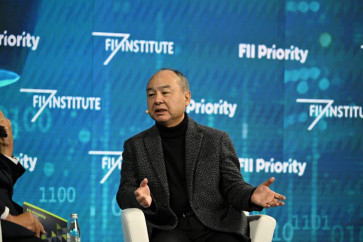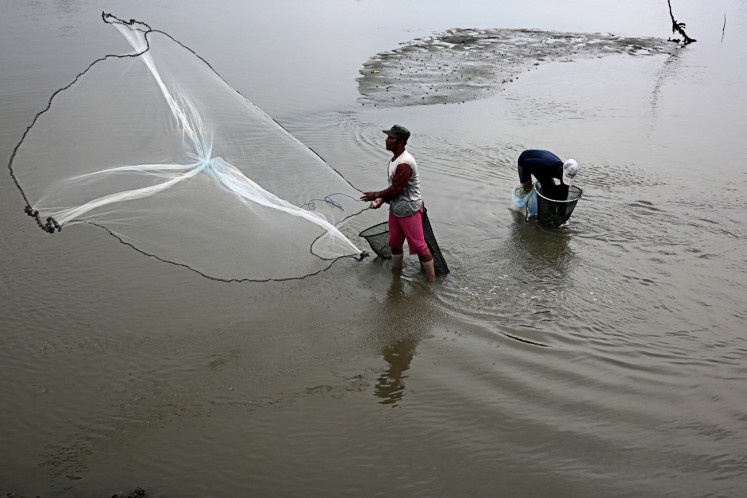Popular Reads
Top Results
Can't find what you're looking for?
View all search resultsPopular Reads
Top Results
Can't find what you're looking for?
View all search resultsRI banks face more difficulties in expanding in S’pore
Expansion of Indonesian banks operating in Singapore will likely be halted following stricter requirements for foreign banks to have the so-called “qualifying full bank” (QFB) license
Change text size
Gift Premium Articles
to Anyone
E
xpansion of Indonesian banks operating in Singapore will likely be halted following stricter requirements for foreign banks to have the so-called “qualifying full bank” (QFB) license.
Under the new rules, QFBs, which have greater branching privileges than other foreign banks, must be locally incorporated, meaning they must set up a local legal entity rather than a foreign-owned subsidiary to safeguard the domestic retail banking market.
A locally incorporated bank in Singapore needs to commit a minimum of S$1.5 billion (US$1.2 billion) in capital and comply with the country’s stringent capital requirements, which include a Tier-1 ratio of 9 percent.
“The new regulation has very much hindered foreign banks’ retail banking developments in Singapore,” said Budi Gunadi Sadikin, managing director of micro and retail banking at Indonesia’s top lender, Bank Mandiri (BMRI), which operates under an offshore bank license in Singapore.
“We previously wanted to operate as a QFB, but with the latest regulation, now we just want to open a new branch,” Bank Negara Indonesia (BBNI) international division head Abdullah Firman Wibowo told The Jakarta Post on Monday.
State-owned BNI, the nation’s fourth largest lender, currently has two branches in Singapore, operating with full bank and limited purpose bank licenses, according to Firman. None of the existing eight QFBs are from Indonesia.
There are 200,000 Indonesians living permanently in Singapore, and Indonesia is also the largest tourism market for Singapore, with almost 2.6 million visitors to Singapore last year coming from Indonesia, nearly 20 percent of overall tourist arrivals.
“We need more branches in Singapore because there are many Indonesians who need BNI services there,” Firman said, hoping that current “diplomatic discussions” on the matter with the Monetary Authority Singapore (MAS) would succeed.
BNI would seek back up from Bank Indonesia (BI) through a “political approach” so that it could open new branches in Singapore without a QFB license, and Firman was upbeat that the lender had a good bargaining position given Singaporean lenders’ interests in Indonesia.
“Singapore wants Danamon. There needs to be reciprocity. We can’t allow many Singaporean banks here while our banks are facing difficulties there,” he added.
Singapore’s largest bank DBS’ $7.2 billion bid for Indonesia’s No. 6 lender Bank Danamon (BDMN) has resurrected reciprocity issues between the two countries.
BI spokesman Difi Johansyah said the central bank’s new multiple licensing regulation, which will be announced later in September, would consider reciprocity treatment.
Banks operating in Indonesia only need one license to operate any kind of banking services at present, but after the new regulation they will require multiple licenses to operate here.
MAS will continue to consider awarding new QFB licenses only under free trade agreement (FTA) negotiations.
With the new rules, Singapore wants its three local banks to be the “anchor banks” and have at least half of residents’ deposits, while ensuring that greater foreign bank participation does not result in a fragmented and inefficient market, local top officials have been quoted as saying.
Key changes to QFB
- MAS will require existing QFBs that are important to the domestic market to locally incorporate their retail operations; This includes setting up a local legal entity rather than a foreign-owned subsidiary; criteria includes a share of domestic deposits.
- Out of the 8 QFBs, Citibank Singapore is already locally incorporated in Singapore; Standard Chartered is planning to do so.
- This brings the regulation in line with neighboring countries such as Malaysia and Indonesia.
- Locally incorporated banks which become significantly rooted may be allowed to increase their points of presence to 50 instead of 25, including as many as 35 branches.
- MAS will continue to award new QFBs only under FTA (Free Trade Agreement) negotiations; New QFBs that are granted under future FTA offers will have to incorporate locally first before they are allowed to establish up to 25 places of business.
- A locally incorporated bank needs to commit a minimum of S$1.5b in capital and comply with the country’s stringent capital requirements, which include a Tier-1 ratio of 9% under Basel III rules.
Source: Bank Mandiri’s summary of the Monetary Authority Singapore’s (MAS) regulation










